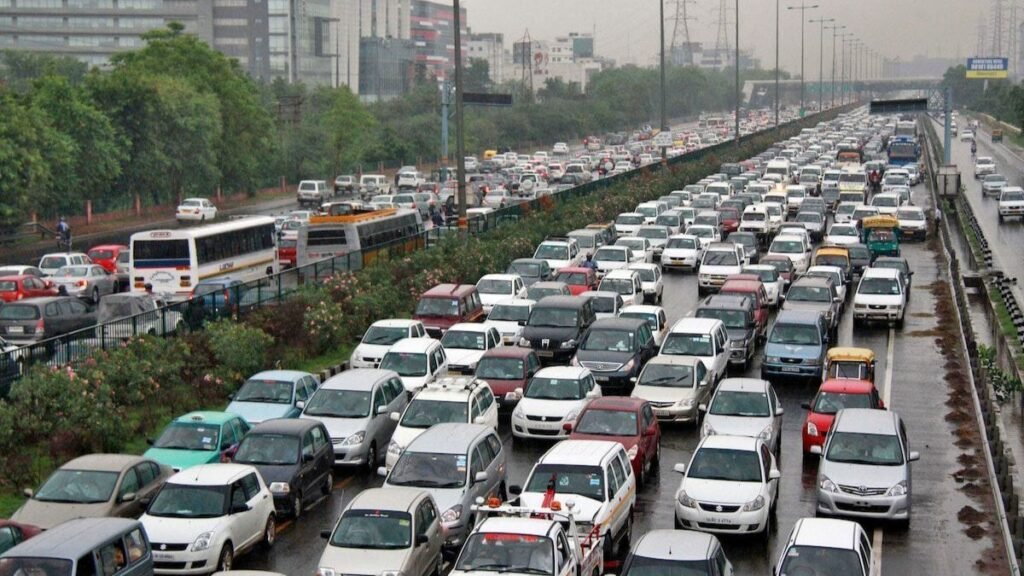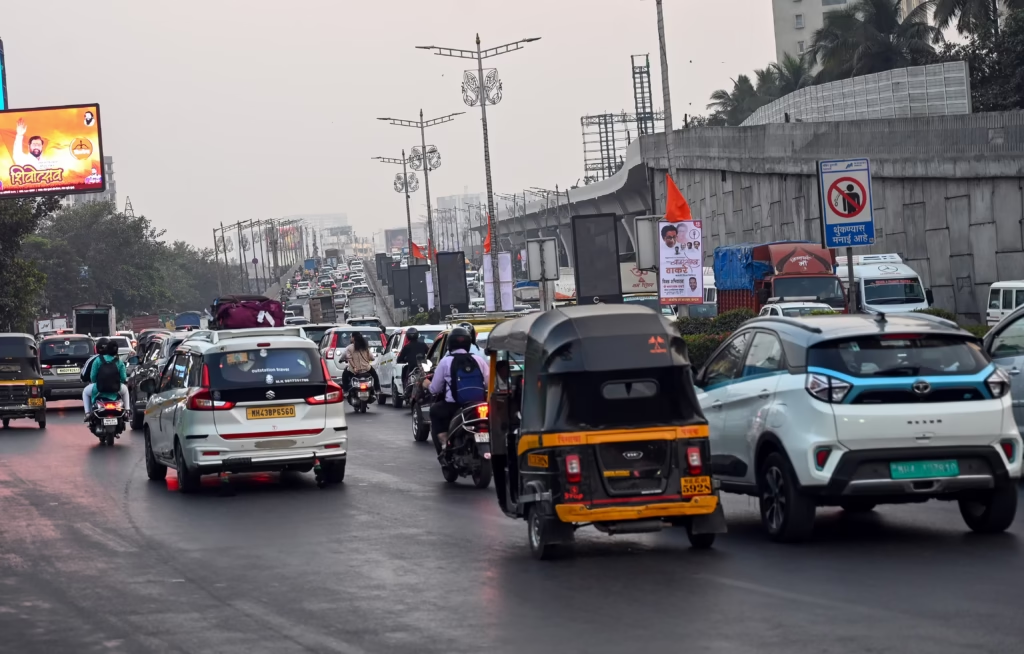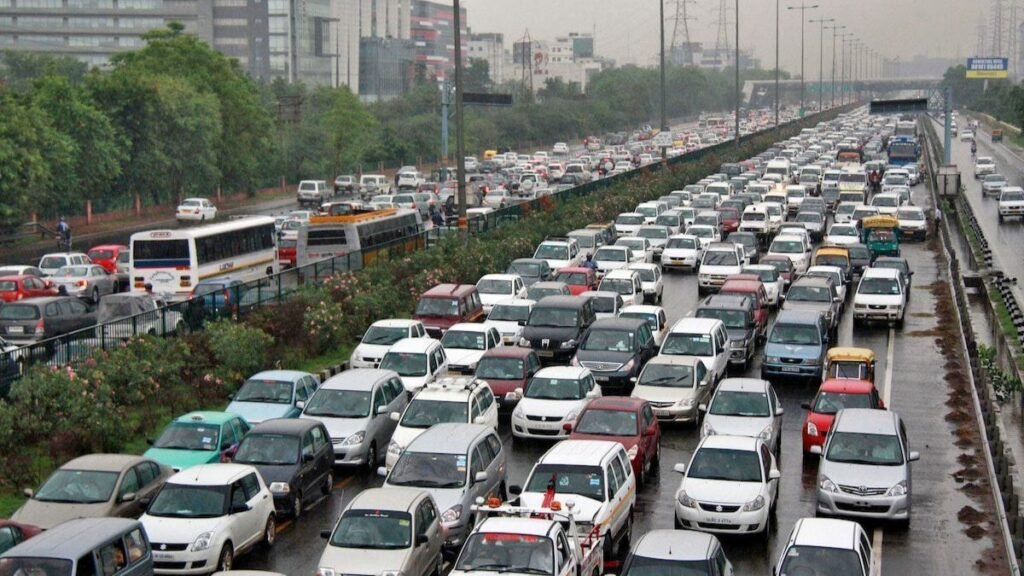

Maharashtra’s Plan to Ban Petrol and Diesel Vehicles in Mumbai, India’s financial capital, is grappling with severe air pollution, which has prompted the Maharashtra government to explore a bold new initiative: banning petrol and diesel vehicles within the city. This move aims to combat rising pollution levels and promote the adoption of electric and alternative fuel vehicles. Given Mumbai’s dense traffic and industrial growth, the government is considering significant policy changes to ensure a cleaner and more sustainable future.
While this proposal is still under review, its potential impact on Mumbai’s economy, transportation network, and citizens’ daily lives cannot be ignored. The government has formed a special committee to assess the feasibility of this ban, considering both environmental benefits and the challenges of infrastructure development for electric vehicles (EVs). If implemented, this plan could position Mumbai as a leader in India’s green transportation revolution.
1. The Need for an Eco-Friendly Transportation System
Mumbai’s air quality has been declining due to the rapid increase in vehicular emissions, industrial pollution, and construction activities. Petrol and diesel vehicles are one of the major contributors to this problem, releasing harmful gases like carbon monoxide, nitrogen oxides, and particulate matter. These pollutants not only cause respiratory diseases but also contribute to global warming. Maharashtra’s Plan to Ban Petrol and Diesel Vehicles in Mumbai, A shift to electric and CNG-powered vehicles can significantly reduce these harmful emissions and lead to cleaner air in the city.
The Maharashtra government understands that reducing pollution is necessary for a healthier population and a sustainable future. Cities like Delhi have already experimented with policies like the Odd-Even scheme to reduce vehicular pollution. However, a long-term solution lies in transitioning away from fossil fuel-based vehicles altogether. Maharashtra’s Plan to Ban Petrol and Diesel Vehicles in Mumbai, This proposed ban is expected to accelerate the adoption of electric vehicles, making Mumbai one of the first Indian cities to take a firm stand against pollution caused by fuel-driven automobiles.
2. Potential Challenges in Implementation
Maharashtra’s Plan to Ban Petrol and Diesel Vehicles in Mumbai, Despite the advantages of banning petrol and diesel vehicles, implementing such a significant change will not be easy. One of the biggest challenges is the lack of proper EV infrastructure in Mumbai. Charging stations are still scarce, and the time taken to charge electric vehicles is significantly longer compared to refueling traditional vehicles. Additionally, the initial cost of purchasing electric vehicles is high, making it difficult for middle-class citizens to switch immediately.
Maharashtra’s Plan to Ban Petrol and Diesel Vehicles in Mumbai, Another concern is whether the electricity required to power the increasing number of EVs will come from clean sources. If electricity is still generated using coal-based power plants, the environmental benefits of EVs could be reduced. The Maharashtra’s Plan to Ban Petrol and Diesel Vehicles in Mumbai government will need to invest heavily in renewable energy sources like solar and wind power to ensure that this transition is truly sustainable. Without proper planning and support, the shift from petrol and diesel vehicles could create new problems rather than solving existing ones.
3. Impact on Businesses and Daily Commuters
Maharashtra’s Plan to Ban Petrol and Diesel Vehicles Mumbai is one of India’s busiest cities, where millions of people depend on public and private transport daily. Many businesses, including food delivery services, logistics companies, and cab aggregators, rely on petrol and diesel vehicles for their operations. A sudden ban on these vehicles could lead to financial losses, increased costs, and logistical challenges, making it difficult for businesses to function smoothly.
For daily commuters, the availability and affordability of electric transport options will be a major concern. Many people own two-wheelers and cars that run on petrol and diesel, and replacing them with electric alternatives may not be financially viable. Maharashtra’s Plan to Ban Petrol and Diesel Vehicles in Mumbai the government will need to introduce schemes such as subsidies on EV purchases, tax benefits, and financial assistance for companies transitioning to electric fleets. Without proper incentives and a gradual shift, this policy could cause economic strain on both businesses and individuals.
4. Learning from Global Case Studies
Maharashtra’s Plan to Ban Petrol and Diesel Vehicles in Mumbai, Several countries have already taken significant steps to reduce or eliminate petrol and diesel vehicles from their cities. For example, London has introduced Ultra Low Emission Zones (ULEZ), where only electric and hybrid vehicles are allowed to enter without paying a heavy fine. Similarly, Amsterdam and Paris have set targets to phase out fossil fuel vehicles within the next decade, encouraging residents to adopt cleaner alternatives through subsidies and infrastructure development.
Maharashtra’s Plan to Ban Petrol and Diesel Vehicles in Mumbai, By studying these global models, Mumbai can develop a step-by-step plan rather than enforcing a sudden ban. A phased approach, where older petrol and diesel vehicles are gradually taken off the roads while incentives are given to EV owners, would be more practical. Additionally, investments in improving public transportation, such as electric buses and metro services, can help reduce dependency on private vehicles, making the transition smoother and more effective.
5. The Road Ahead: Sustainable Mobility for Mumbai
To successfully implement this ambitious plan,Maharashtra’s Plan to Ban Petrol and Diesel Vehicles in Mumbai the Maharashtra government needs a well-structured strategy that addresses both infrastructure and affordability. Increasing the number of charging stations, offering financial support to those looking to switch to EVs, and improving the public transport network are some key steps that need to be taken. Additionally, partnerships with private companies for battery-swapping technologies and renewable energy integration will be crucial for the long-term success of this transition.
Public awareness is also essential for the success of this initiative. Many people are still hesitant to switch to electric vehicles due to concerns about battery life, maintenance costs, and resale value. Educational campaigns about the benefits of EVs, along with real-world success stories, can help in changing public perception. With the right policies, incentives, and planning, Mumbai can set an example for other Indian cities, proving that a fossil-fuel-free future is not just an idea but a reality within reach.
Buy Domin and Hosting with our trusted websites
https://www.hostinger.in/
https://www.bluehost.com/




Leave a Reply